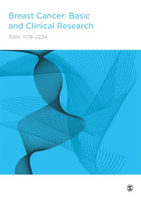
Breast Cancer-Basic and Clinical Research
Scope & Guideline
Exploring the frontiers of oncology together.
Introduction
Aims and Scopes
- Translational Research:
The journal emphasizes translational research that aims to convert laboratory findings into clinical applications, thereby improving patient outcomes in breast cancer treatment. - Therapeutic Innovations:
A core area of focus is the exploration of new therapeutic options, including targeted therapies and novel treatment regimens specifically for various breast cancer subtypes. - Epidemiology and Public Health:
The journal also addresses epidemiological studies that investigate the prevalence, risk factors, and awareness of breast cancer, highlighting the importance of preventive measures and screening. - Biomarkers and Diagnostics:
Research on biomarkers that aid in the diagnosis, prognosis, and treatment response of breast cancer is a significant aspect, aiming to personalize treatment plans based on individual patient profiles. - Surgical and Radiological Techniques:
The effectiveness and outcomes of various surgical techniques and radiological assessments in breast cancer management are frequently explored, providing insights into best practices.
Trending and Emerging
- Targeted Therapy and Personalized Medicine:
There is a growing emphasis on targeted therapies and personalized medicine approaches, particularly for hormone receptor-positive and HER2-positive breast cancer, indicating a shift towards more individualized treatment strategies. - Impact of Lifestyle Factors:
Recent studies are increasingly exploring the impact of lifestyle factors, such as obesity and metabolic syndrome, on breast cancer outcomes, suggesting a trend towards understanding the holistic health of patients. - Psychosocial Aspects and Quality of Life:
Research focusing on the psychosocial aspects of breast cancer, including coping mechanisms and quality of life post-treatment, is emerging as a vital area, acknowledging the importance of mental health in cancer care. - Innovative Diagnostic Techniques:
There is a significant trend towards exploring innovative diagnostic techniques, including the use of biomarkers and advanced imaging technologies, to enhance early detection and treatment monitoring. - Role of Immunotherapy:
The exploration of immunotherapy as a treatment modality for breast cancer is gaining momentum, reflecting broader trends in oncology towards harnessing the immune system to combat cancer.
Declining or Waning
- Histopathological Studies:
There has been a noticeable decline in the publication of purely histopathological studies, as the field moves towards integrating molecular and genetic factors into clinical practice. - Traditional Chemotherapy Protocols:
Research focusing on traditional chemotherapy regimens is less frequent, reflecting a broader trend towards exploring targeted therapies and personalized medicine. - Sociodemographic Studies on Awareness:
Although studies on awareness and education around breast cancer were once prevalent, recent publications indicate a waning interest in purely sociological approaches without a direct clinical correlation.
Similar Journals
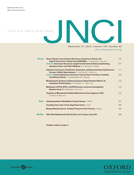
JNCI-Journal of the National Cancer Institute
Unveiling the complexities of cancer for better outcomes.JNCI-Journal of the National Cancer Institute, published by Oxford University Press Inc. in the United Kingdom, is a premier journal dedicated to advancing the field of cancer research and oncology. With a distinguished history dating back to 1940, this journal has consistently maintained a strong reputation within the academic community, achieving a remarkable Q1 ranking in both Cancer Research and Oncology as of 2023. Researchers and practitioners rely on the JNCI for original research articles, review papers, and cutting-edge findings that impact clinical practices and therapeutic strategies. Although it does not currently offer open access, the journal remains a vital resource for academicians and healthcare professionals seeking to enhance their understanding of cancer mechanisms and treatment innovations. Its rigorous peer-review process ensures the publication of high-quality, credible research that meets the evolving challenges of cancer treatment and prevention through to 2024.

NEOPLASMA
Elevating Knowledge in Oncology and BeyondNEOPLASMA is a prominent journal published by AEPRESS SRO, dedicated to the multifaceted field of oncology and cancer research. Since its inception in 1957, this esteemed publication has served as a vital platform for advancing the understanding of neoplastic diseases, disseminating high-quality research findings that contribute to clinical and laboratory advancements. Operating under a robust framework of peer review, NEOPLASMA holds significant credibility, as evidenced by its Q2 ranking in the Medicine (miscellaneous) category and Q3 rankings in both Cancer Research and Oncology for 2023. Furthermore, with an ISSN of 0028-2685 and E-ISSN 1338-4317, the journal fosters accessibility to valuable scientific content despite the absence of open access options. Positioned in Bratislava, Slovakia, NEOPLASMA continues to attract a global readership, making substantial contributions to the fields of biochemistry, genetics, and molecular biology as highlighted by its Scopus rankings. This journal is essential reading for researchers, professionals, and students looking to stay abreast of the latest developments in cancer research and treatment strategies.

INDIAN JOURNAL OF CANCER
Connecting Researchers for a Cancer-Free FutureINDIAN JOURNAL OF CANCER, published by WOLTERS KLUWER MEDKNOW PUBLICATIONS, stands as a pivotal resource in the field of oncology, providing dedicated insight into cancer research and its clinical applications since its inception in 1965. With an ISSN of 0019-509X and an E-ISSN of 1998-4774, this esteemed journal facilitates the dissemination of knowledge related to cancer prevention, diagnosis, and treatment strategies within the Indian context and beyond. Although classified within the Q3 quartile of oncology journals and ranked #292 out of 404 in its category in the Scopus database, the INDIAN JOURNAL OF CANCER continues to play a vital role in advancing the dialogue around cancer management. This journal is particularly significant for researchers, professionals, and students intent on contributing to the evolving landscape of oncology, offering a platform for sharing innovative findings and fostering collaboration among the academic community. Located in Mumbai, India, the journal's commitment to impactful research is reflected in its ongoing efforts to bridge gaps in cancer knowledge and address the unique challenges faced within the region and globally.
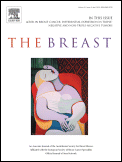
BREAST
Illuminating the path to better breast health solutions.BREAST is a leading peer-reviewed journal dedicated to advancing knowledge and practice in the fields of cancer research, oncology, and surgery, published by Churchill Livingstone. With an impressive impact factor and a prestigious Q1 ranking in multiple categories including Cancer Research, Medicine, and Surgery, the journal consistently delivers high-quality content that informs and inspires researchers, clinicians, and educators. Since its transition to Open Access in 2020, BREAST has significantly expanded its reach, providing immediate and unrestricted access to pivotal studies and findings in breast health and disease management. With a history dating back to 1992 and converging to 2024, the journal serves as an essential resource for the latest developments and innovative approaches in the clinical and biomedical aspects of breast care. Scholars and professionals alike can explore a wealth of research aimed at improving patient outcomes and fostering scientific dialogue in this vital area of healthcare.
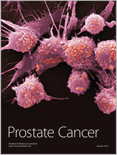
Prostate Cancer
Transforming research into real-world impact for prostate cancer.Prostate Cancer is a leading peer-reviewed Open Access journal published by HINDAWI LTD, dedicated to advancing the field of urology and oncology through high-quality research and innovative studies. Established in 2011, this journal serves as a vital platform for disseminating findings related to prostate cancer diagnostics, treatment strategies, and patient care, striving to collaborate and connect researchers from around the globe. With an impact factor reflective of its critical input in the scientific community, the journal showcases compelling manuscripts, reviews, and case reports that are accessible to a wide audience given its open access policy. Located in London, England, Prostate Cancer has made significant strides in its category quartiles, achieving Q4 in Cancer Research and Q3 in both Oncology and Urology as of 2023, reflecting its growing relevance and readership. With Scopus rankings indicating its position within the broader medical fields, the journal is a valuable resource for researchers, professionals, and students alike, contributing to the collective effort to improve outcomes in prostate cancer research and treatment.
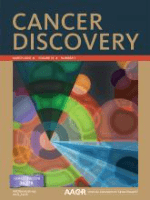
Cancer Discovery
Catalyzing Collaboration for a Cancer-Free FutureCancer Discovery, published by the American Association for Cancer Research, stands as a vital resource in the oncological research community, renowned for its commitment to disseminating groundbreaking studies and innovative findings in cancer biology, prevention, diagnostics, and treatment. With a significant impact factor reflecting its esteemed position, this journal facilitates open discussions and collaborations, striving to bridge the gap between experimental and clinical research. The journal, which has been active since 2011, is classified as a Q1 publication in 2023, underscoring its influence and authority in the realm of Oncology. By providing a platform for rigorous peer-reviewed articles, Cancer Discovery aims to advance our understanding of cancer and enhance therapeutic strategies, making it an indispensable tool for researchers, professionals, and students eager to stay at the forefront of cancer research.

Oncology Reviews
Pioneering Knowledge in Oncology and BeyondOncology Reviews, founded in 2007 and published by FRONTIERS MEDIA SA, is a leading open-access journal dedicated to advancing knowledge in the field of oncology and cancer research. With an Impact Factor reflecting its robust engagement in scholarly discourse, this journal maintains a prestigious standing, earning a Q2 ranking in Oncology and a Q3 ranking in Cancer Research as of 2023. Notably, it is indexed in Scopus, where it ranks #118 in Oncology and #98 in Cancer Research, highlighting its global reach and significance. The journal's open-access policy, in effect since 2012, ensures that high-quality research is accessible to all, fostering collaboration and wellness improvements worldwide. This commitment to accessibility and dissemination of pivotal research makes Oncology Reviews an essential resource for researchers, healthcare professionals, and students eager to contribute to and stay abreast of the latest innovations in cancer treatment and research.

Breast Cancer
Unveiling cutting-edge discoveries in breast cancer treatment.Breast Cancer is a prestigious peer-reviewed journal published by SPRINGER JAPAN KK, specializing in the multifaceted domains of oncology and medical pharmacology. With an impressive impact factor and recognized within the Q1 category in multiple areas, including Medicine (miscellaneous), Radiology, and Nuclear Medicine and Imaging, this journal serves as a fundamental resource for cutting-edge research and clinical advancements in breast cancer treatment and care. Its indexed presence in renowned databases like Scopus further affirms its significance, ranking 56th in Radiology and 60th in Pharmacology. The journal aims to bridge the gap between clinical practice and scientific research by publishing original articles, reviews, and case studies that enhance understanding and improve patient outcomes. With converged content available from 1994 to 2024, the journal is dedicated to fostering innovative research while engaging a global audience of researchers, clinicians, and students passionate about tackling breast cancer challenges.
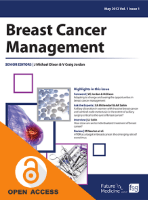
Breast Cancer Management
Shaping the Future of Patient Care.Breast Cancer Management is a pivotal journal in the field of oncology and radiology, published by FUTURE MEDICINE LTD. Since its transition to Open Access in 2018, the journal has aimed to democratize access to cutting-edge research focused on innovative treatments and management strategies for breast cancer. With an ISSN of 1758-1923 and an E-ISSN of 1758-1931, it provides a platform for researchers and clinicians to share findings that enhance patient care and outcomes. The journal has garnered significant attention, placing in the Q3 quartile in Oncology and Q2 in Radiology, Nuclear Medicine, and Imaging as of 2023. Positioned in the United Kingdom, its editorial focus and rigorous peer-review process ensure that it remains at the forefront of breast cancer research. As breast cancer continues to be a major health concern globally, Breast Cancer Management serves as an essential resource for advancing knowledge and fostering collaboration among professionals in this vital area of medicine.
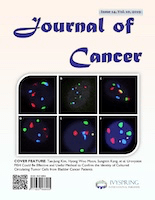
Journal of Cancer
Advancing oncology through groundbreaking research.Journal of Cancer is a premier, peer-reviewed academic journal published by IVYSPRING INTERNATIONAL PUBLISHING that focuses on advancing the field of oncology. With an impact factor reflecting its significant contributions, this journal ranks in the 80th percentile of medical journals pertaining to oncology, positioning it at #79 out of 404 in Scopus. Since its inception in 2010, the journal has embraced an Open Access model, ensuring that groundbreaking research reaches a global audience without barriers. Based in Australia, the journal addresses a wide array of topics within cancer research, catering to researchers, healthcare professionals, and students committed to enhancing their understanding of the complexities of cancer. Amidst evolving challenges in oncology, the Journal of Cancer serves as a vital platform for disseminating innovative findings, fostering collaboration, and promoting informed decisions that can lead to improved cancer outcomes worldwide.